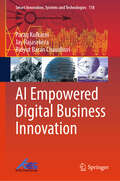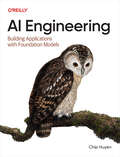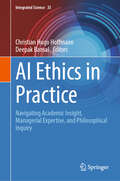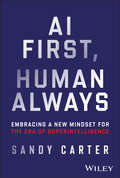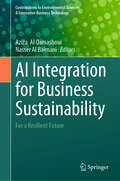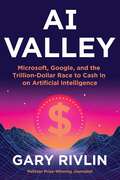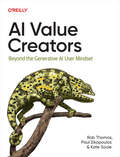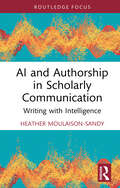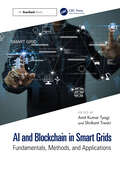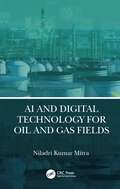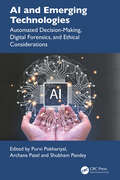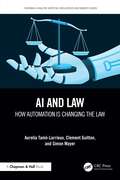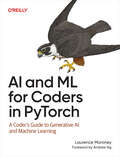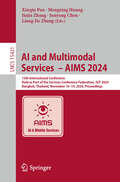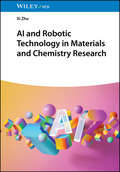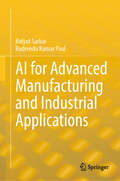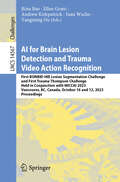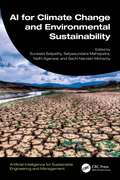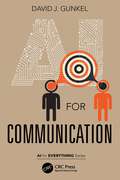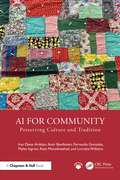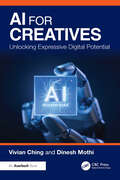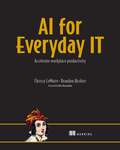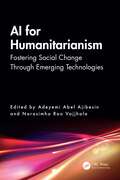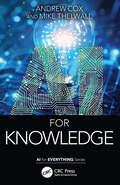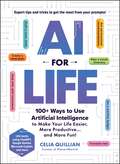- Table View
- List View
AI Empowered Digital Business Innovation (Smart Innovation, Systems and Technologies #118)
by Parag Kulkarni Jay Rajasekera Bidyut Baran ChaudhuriDigital business innovation is not simply about using new technologies and upgrading business plans but about upgrading your strategic thinking and embedding AI in the thought process. This book covers digital technologies and the strategic landscape of digital entrepreneurship. It elaborates how AI advances converge to create new learning and business opportunities. It includes digital business innovation technologies, AI strategies for businesses, and learning and collaborative learning strategies. Digital business innovation empowers business or changes the paradigm of business and at times redefines it with intelligent technologies. This in turn helps organizations and businesses create better value for customers and address problems that were not possible to address in the past. Digital business innovation can be approached at three levels to increase contextual participation. It includes focused business innovation, strategic AI innovation, and intelligent implementation. The book contains real-life stories of digital business innovation from companies in countries such as Japan, the USA, India, and Singapore. The authors have contributed and witnessed these technological innovations, and hence bring first-hand experience to help readers participate in this journey. It is the journey to create new success stories through AI research that empowers business transformation.
AI Engineering: Building Applications with Foundation Models
by Chip HuyenRecent breakthroughs in AI have not only increased demand for AI products, they've also lowered the barriers to entry for those who want to build AI products. The model-as-a-service approach has transformed AI from an esoteric discipline into a powerful development tool that anyone can use. Everyone, including those with minimal or no prior AI experience, can now leverage AI models to build applications. In this book, author Chip Huyen discusses AI engineering: the process of building applications with readily available foundation models.The book starts with an overview of AI engineering, explaining how it differs from traditional ML engineering and discussing the new AI stack. The more AI is used, the more opportunities there are for catastrophic failures, and therefore, the more important evaluation becomes. This book discusses different approaches to evaluating open-ended models, including the rapidly growing AI-as-a-judge approach.AI application developers will discover how to navigate the AI landscape, including models, datasets, evaluation benchmarks, and the seemingly infinite number of use cases and application patterns. You'll learn a framework for developing an AI application, starting with simple techniques and progressing toward more sophisticated methods, and discover how to efficiently deploy these applications.Understand what AI engineering is and how it differs from traditional machine learning engineeringLearn the process for developing an AI application, the challenges at each step, and approaches to address themExplore various model adaptation techniques, including prompt engineering, RAG, fine-tuning, agents, and dataset engineering, and understand how and why they workExamine the bottlenecks for latency and cost when serving foundation models and learn how to overcome themChoose the right model, dataset, evaluation benchmarks, and metrics for your needsChip Huyen works to accelerate data analytics on GPUs at Voltron Data. Previously, she was with Snorkel AI and NVIDIA, founded an AI infrastructure startup, and taught Machine Learning Systems Design at Stanford. She's the author of the book Designing Machine Learning Systems, an Amazon bestseller in AI.AI Engineering builds upon and is complementary to Designing Machine Learning Systems (O'Reilly).
AI Ethics in Practice: Navigating Academic Insight, Managerial Expertise, and Philosophical Inquiry (Integrated Science #35)
by Christian Hugo Hoffmann Deepak BansalThis book takes us on an in-depth exploration of the evolving intersection between artificial intelligence and ethical considerations. As AI applications extend far beyond technology giants, a robust ethical debate unfolds, addressing issues of discrimination, democracy, and due process. Tech startups, often lacking corporate governance and legal expertise, become central figures in this narrative, facing unique uncertainties. Grounded in applied ethics, this collaborative work between experts from practice and academia investigates responsible tech entrepreneurship, also helping lay practical foundations for startups. Providing diagnostic tools and frameworks, the book is tailored for academics, researchers, and professionals navigating the ethical dimensions of AI in organizational settings. Going beyond managerial insights, the narrative takes a philosophical turn, contemplating not just the capabilities but the ethical responsibilities of AI. Rooted in effective altruism and conceptual analyses, this book serves as a critical resource for those seeking informed, ethical decision-making in the rapidly evolving technological landscape.
AI First, Human Always: Embracing a New Mindset for the Era of Superintelligence
by Sandy CarterLeadership wisdom to ride the wave of the seven hottest trends in our new AI-first world of business Written by seasoned tech executive Sandy Carter, AI First, Human Always: Embracing a New Mindset for the Era of Superintelligence is your guidebook to the seven hottest trends in AI. This book will recalibrate your approach to the exponential curve of emerging AI solutions for business. It will help you transform today's unstoppable currents of change into tailwinds that propel your organization to great heights. From the tokenization of everything, to multi-model learning models, to the importance of technical convergence and the implementation of digital twins across almost every industry imaginable, this book provides an essential core knowledge base as well as examples and case studies to help you transform your approach to leadership to meet the demands of the modern business era. Throughout the book, Carter drives home the essential coexistence of technology, emotion, intelligence, creativity, intuition, and ethics to enhance, rather than replace, the human experience. Some of the topics that Carter explores include: How to foster an AI-driven culture with experimentation Strategies for applying first principles before starting an AI project Ways to balance human and AI collaboration AI First, Human Always: Embracing a New Mindset for the Era of Superintelligence is a timely, essential read for all business leaders and professionals aiming to prepare for AI's broader implications on society and the economy. Grab your copy today and stay one step ahead of the competition in a digital world evolving at breakneck speed.
AI Integration for Business Sustainability: For a Resilient Future (Contributions to Environmental Sciences & Innovative Business Technology)
by Aziza Al Qamashoui Nasser Al BaimaniThis book offers a comprehensive exploration of artificial intelligence (AI) integration for business sustainability for a resilient future. Delving into the dynamic interplay between AI and sustainable business practices, it serves as a vital guide for professionals, entrepreneurs, policymakers, and researchers seeking to embrace innovative solutions to drive sustainability initiatives forward. From its inception, the book sets out to showcase the critical role that AI plays in reshaping modern business landscapes towards sustainability. It extensively covers various facets with foundational understanding of sustainability and AI evolution and detailed insights into successful AI integration in industries such as agriculture, education, energy, manufacturing, and healthcare. Through real-world case studies and practical strategies, it illuminates how AI can optimize operations, mitigate environmental impact, and foster social responsibility. The book addresses the core challenges faced by businesses in implementing AI-driven sustainability solutions. It navigates through adoption barriers, regulatory concerns, and ethical considerations, offering actionable advice for responsible AI integration. Furthermore, it presents future trends and emerging technologies, empowering readers to anticipate disruptions and utilize innovative AI solutions.
AI Valley: Microsoft, Google, and the Trillion-Dollar Race to Cash In on Artificial Intelligence
by Gary RivlinA veteran Pulitzer Prize-winning journalist shadows the top thinkers in the field of Artificial Intelligence, introducing the breakthroughs and developments that will change the way we live and work. Artificial Intelligence has been “just around the corner” for decades, continually disappointing those who long believed in its potential. But now, with the emergence and growing use of ChatGPT, Gemini, and a rapidly multiplying number of other AI tools, many are wondering: Has AI’s moment finally arrived?In AI Valley, Pulitzer Prize-winning journalist Gary Rivlin brings us deep into the world of AI development in Silicon Valley. Over the course of more than a year, Rivlin closely follows founders and venture capitalists trying to capitalize on this AI moment. That includes LinkedIn founder Reid Hoffman, the legendary investor whom the Wall Street Journal once called, “the most connected person in Silicon Valley.”Through Hoffman, Rivlin is granted access to a number of companies on the cutting-edge of AI research, such as Inflection AI, the company Hoffman cofounded in 2022, and OpenAI, the San Francisco-based startup that sparked it all with its release at the end of that year of ChatGPT. In addition to Hoffman, Rivlin introduces us to other AI experts, including OpenAI cofounder Sam Altman and Mustafa Suleyman, the co-founder of DeepMind, an early AI startup that Google bought for $650 million in 2014. Rivlin also brings readers inside Microsoft, Meta, Google and other tech giants scrambling to keep pace.On this vast frontier, no one knows which of these companies will hit it big–or which will flame out spectacularly. In this riveting narrative marbled with familiar names such as Musk, Zuckerberg, and Gates, Rivlin chronicles breakthroughs as they happen, giving us a deep understanding of what’s around the corner in AI development. An adventure story full of drama and unforgettable personalities, AI Valley promises to be the definitive story for anyone seeking to understand the latest phase of world-changing discoveries and the minds behind them.
AI Value Creators
by Rob Thomas Paul Zikopoulos Kate SouleWe've arrived in a new era—GenAI is reshaping industries and decision-making processes across the board. As a result, understanding their potential and pitfalls has become crucial. But in order to stay ahead of the curve, you'll need to develop fresh perspectives on leveraging AI beyond mere technical know-how. Geared toward business leaders and tech professionals alike, this book demystifies the strategic integration of AI into business practices, ensuring you're equipped not just to participate but to lead in this new landscape. This insightful guide by industry leaders Rob Thomas, Paul Zikopoulos, and Kate Soule goes beyond the basics, offering real-life success stories and learned lessons to provide a blueprint for meaningful AI engagement. Whether you're a novice or a seasoned expert, you'll come away with an enhanced understanding of GenAI. Recognize the transformative potential of AI in business and how to harness itNavigate the ethical and operational challenges posed by AI with confidenceUnderstand the dynamic interplay between AI technology and business strategyImplement actionable strategies to integrate AI into your organizational cultureStep confidently into the role of an AI value creator, equipped to lead and innovate
AI and Authorship in Scholarly Communication: Writing with Intelligence
by Heather Moulaison-SandyAI and Authorship in Scholarly Communication explores the role of artificial intelligence (AI) as it pertains to scholarly research and writing.Explaining what AI is and how it can be used by scholars, the book also focuses on aspects with the potential to change the scholarly communication landscape. Bringing together research on AI and writing from the scholarly literature in LIS and beyond, the book weaves together information about essential topics relating to AI and authorship. In laying out the primary concerns surrounding AI in the field of scholarly communication, Moulaison-Sandy considers how those concerns map to norms and practices in research and writing. The book likewise explores the future landscape of scholarly communication, an environment in which AI will continue to play an important role.AI and Authorship in Scholarly Communication will be of great interest to scholars, students, and practitioners and will be particularly useful to those studying AI or authorship from a library and information science (LIS) perspective. Researchers or practitioners working in higher education or with learning technologies will also find much to interest them within the pages of the book.
AI and Blockchain in Smart Grids: Fundamentals, Methods, and Applications
by Amit Kumar Tyagi Shrikant TiwariAI and Blockchain in Smart Grids: Fundamentals, Methods, and Applications examines the cutting-edge solution that combines artificial intelligence (AI), blockchain technology, and digital twin concepts to innovate the management and optimization of electrical power distribution. This innovative approach enhances the resilience, efficiency, and security of electricity grids while providing real-time insights for grid operators and stakeholders. The book covers such key elements as using: Digital twins in smart grids to gather real-time data from various grid components AI-powered analytics to process the data generated by digital twins and to analyze this information to detect patterns, predict grid failures, and recommend adjustments to enhance a grid's performance Blockchain-based security to ensure the secure and transparent management of data within a smart grid, especially a tamper-resistant ledger to store information related to energy production, distribution, and consumption Decentralized data sharing to allow grid data to be shared securely among various stakeholders, including utilities, regulators, and consumers Grid optimization techniques to improve electricity distribution, reduce energy waste, and balance supply and demand efficiently Select real-world case studies and practical examples demonstrate how AI and blockchain are currently being applied to enhance grid management, energy distribution, and sustainability. By explaining to researchers, academics, and students how AI and blockchain can revolutionize electricity distribution and make grids smarter, more secure, and environmentally friendly, the book points to a future where grid operators, regulators, and consumers will benefit from real-time data and a resilient, efficient energy ecosystem.
AI and Digital Technology for Oil and Gas Fields
by Niladri Kumar MitraThe book essentially covers the growing role of AI in the oil and gas industry, including digital technologies used in the exploration phase, customer sales service, and cloud-based digital storage of reservoir simulation data for modeling. It starts with the description of AI systems and their roles within the oil and gas industry, including the agent-based system, the impact of industrial IoT on business models, and the ethics of robotics in AI implementation. It discusses incorporating AI into operations, leading to the reduction of operating costs by localizing control functions, remote monitoring, and supervision.Features of this book are given as follows: It is an exclusive title on the application of AI and digital technology in the oil and gas industry It explains cloud data management in reservoir simulation It discusses intelligent oil and gas well completion in detail It covers marketing aspects of oil and gas business during the exploration phase It reviews development of digital systems for business purposes This book is aimed at professionals in petroleum and chemical engineering, technology, and engineering management.
AI and Emerging Technologies: Automated Decision-Making, Digital Forensics, and Ethical Considerations
by Archana Patel Purvi Pokhariyal Shubham PandeyIn the past decade, Artificial Intelligence (AI) has made significant advancements in various sectors of society, such as education, health, e-commerce, media and entertainment, banking and finance, transportation, and defense, among others. Its application has permeated every sector, leaving no area untouched. However, the utilization of AI brings forth crucial legal, ethical, and technical concerns and obstacles that must be appropriately addressed through thoughtful deliberation, discussions, and the implementation of effective regulations.AI and Emerging Technologies: Automated Decision-Making, Digital Forensics, and Ethical Considerations provides a comprehensive and insightful roadmap for exploring the advancements, challenges, solutions, and implications of AI in three key areas: the legal field, gaming applications, digital forensic, and decision-making. By delving into these topics, this book offers a deep understanding of how AI can be optimally utilized to deliver maximum benefits to users, all within a single, comprehensive source. One of the focuses of this book is to shed light on the preictal application of emerging technologies in automated decision-making while also addressing the ethical considerations that arise from their use. By examining the integration of these technologies into digital forensics and their impact on other domains, such as gaming applications deep fake, this book presents valuable insights into the broader implications of AI.The book serves as an invaluable resource for anyone seeking to understand and navigate the complex world of AI. By offering a comprehensive exploration of its applications, ethical considerations, and data protection techniques, it provides researchers and scholars, graduate students, software engineers along with data scientists the necessary insights to harness the full potential of AI while ensuring its responsible and ethical use.
AI and Law: How Automation is Changing the Law (Chapman & Hall/CRC Artificial Intelligence and Robotics Series)
by Aurelia Tamo-Larrieux Clement Guitton Simon MayerThis book provides insights into how AI is changing legal practice, government processes, and individuals’ access to those processes, encouraging each of us to consider how technological advances are changing the legal system. Particularly, and distinct from current debates on how to regulate AI, this books focuses on how the progressive merger between computational methods and legal rules changes the very structure and application of the law itself.We investigate how automation is changing the legal analysis, legal rulemaking, legal rule extraction, and application of legal rules and how this impacts individuals, policymakers, civil servants, and society at large. We show through many examples that a debate on how automation is changing the law is needed, which must revolve around the democratic legitimacy of the automation of legal processes, and be informed by the technical feasibility and tradeoffs of specific endeavors.
AI and ML for Coders in PyTorch
by Laurence MoroneyEager to learn AI and machine learning but unsure where to start? Laurence Moroney's hands-on, code-first guide demystifies complex AI concepts without relying on advanced mathematics. Designed for programmers, it focuses on practical applications using PyTorch, helping you build real-world models without feeling overwhelmed.From computer vision and natural language processing (NLP) to generative AI with Hugging Face Transformers, this book equips you with the skills most in demand for AI development today. You'll also learn how to deploy your models across the web and cloud confidently.Gain the confidence to apply AI without needing advanced math or theory expertiseDiscover how to build AI models for computer vision, NLP, and sequence modeling with PyTorchLearn generative AI techniques with Hugging Face Diffusers and Transformers
AI and Multimodal Services – AIMS 2024: 13th International Conference, Held as Part of the Services Conference Federation, SCF 2024, Bangkok, Thailand, November 16–19, 2024, Proceedings (Lecture Notes in Computer Science #15421)
by Mengxing Huang Liang-Jie Zhang Xiuqin Pan Jiajia Zhang Junyang ChenThis book constitutes the refereed proceedings of the 13th International Conference on AI and Multimodal Services – AIMS 2024, AIMS 2024, Held as Part of the Services Conference Federation, SCF 2024, held in Bangkok, Thailand, during November 16-19, 2024. The 7 full papers and one short paper included in this book were carefully reviewed and selected from 16 submissions. They were organized in topical sections as follows: research track; application track; and short paper track.
AI and Robotic Technology in Materials and Chemistry Research
by Xi ZhuA singular resource for researchers seeking to apply artificial intelligence and robotics to materials science In AI and Robotic Technology in Materials and Chemistry Research, distinguished researcher Dr. Xi Zhu delivers an incisive and practical guide to the use of artificial intelligence and robotics in materials science and chemistry. Dr. Zhu explains the principles of AI from the perspective of a scientific researcher, including the challenges of applying the technology to chemical and biomaterials design. He offers concise interviews and surveys of highly regarded industry professionals and highlights the interdisciplinary and broad applicability of widely available AI tools like ChatGPT. The book covers computational methods and approaches from algorithms, models, and experimental data systems, and includes case studies that showcase the real-world applications of artificial intelligence and lab automation in a variety of scientific research settings from around the world. You'll also find: A thorough introduction to the challenges currently being faced by chemists and materials science researchers Comprehensive explorations of autonomous laboratories powered by artificial intelligence and robotics Practical discussions of a blockchain-powered anti-counterfeiting experimental data system in an autonomous laboratory In-depth treatments of large language models as applied to autonomous materials research Perfect for materials scientists, analytical chemists, and robotics engineers, AI and Robotic Technology in Materials and Chemistry Research will also benefit analytical and pharmaceutical chemists, computer analysts, and other professionals and researchers with an interest in artificial intelligence and robotics.
AI for Advanced Manufacturing and Industrial Applications
by Bidyut Sarkar Rudrendu Kumar PaulThis book provides a deep dive into the applications of Artificial Intelligence (AI) in advanced manufacturing and intelligent autonomous systems. Through real-world use cases and cutting-edge insights, it examines how AI, machine learning, IoT, and Industry 5.0 are revolutionizing manufacturing processes from end to end. Discover how integrating AI technologies with data analytics and IoT can unlock smarter, more efficient, and adaptable manufacturing solutions. Learn how predictive algorithms can foresee equipment failures, optimize inventory in real time, and enable autonomous robots to handle complex tasks, from assembly to logistics. With these innovations, manufacturers can achieve new levels of productivity, drive innovation, and create future-ready business models. Designed for industry practitioners, decision-makers, and aspiring professionals, this comprehensive guide offers actionable strategies and practical insights for implementing AI in advanced manufacturing. Whether you&’re a leader seeking to modernize operations or a graduate student aiming to enter this dynamic field, this book will empower you to navigate and leverage the next frontier of industrial innovation.
AI for Brain Lesion Detection and Trauma Video Action Recognition: First BONBID-HIE Lesion Segmentation Challenge and First Trauma Thompson Challenge, Held in Conjunction with MICCAI 2023, Vancouver, BC, Canada, October 16 and 12, 2023, Proceedings (Lecture Notes in Computer Science #14567)
by Andrew Kirkpatrick Rina Bao Ellen Grant Juan Wachs Yangming OuThis book constitutes the proceedings of the First BONBID-HIE Lesion Segmentation Challenge and the First Trauma Thompson Challenge, held in conjunction with MICCAI 2023, in Vancouver, BC, Canada, during October 2023. For BONBID-HIE 2023 Challenge 6 papers have been accepted out of 14 submissions. They span a broad array of approaches leveraging anatomical information about HIE, data augmentation, training strategies, model architecture, and integration with traditional machine learning methods. For the TTC 2023 Trauma Thompson Challenge 4 accepted contributions are included in this book. They deal with advancements in machine learning methods and their practical applications in addressing small and diffuse lesions in HIE segmentation.
AI for Climate Change and Environmental Sustainability (Artificial Intelligence for Sustainable Engineering and Management)
by Suneeta Satpathy Sachi Nandan Mohanty Satyasundara Mahapatra Nidhi AgarwalThis book discusses the adverse effects of climatic changes on our planet. It examines AI-based tools and technologies and how they can assist in identifying energy emission reductions, CO2 removal, and support the development of greener transportation networks, monitoring deforestation, and forecasting extreme weather events.AI for Climate Change and Environmental Sustainability identifies and discusses in detail the importance of environmental sustainability based on accomplishment of the UN's 17 Sustainable Developmental Goals (SDGs). It presents the various AI-based possibilities for accelerating international efforts to safeguard the environment and conserve natural resources. The authors offer a comprehensive analysis of the emerging field of climate change in relation to Internet of Things, artificial intelligence, machine learning, and deep learning. The book discusses AI developments, applications, and best practices that will help us transition to a low-carbon future on both a regional and global scale. It provides case studies with analytical results pertinent to climate change and weather prediction and includes chapters with a research-oriented approach, which can encourage new developments in the field of sustainable climate and green environment.The book can be used as a primary textbook for graduate and postgraduate students in technology and science, as well as a reference for researchers, academics, and IT professionals working on climate change and sustainability initiatives.
AI for Communication (AI for Everything)
by David J. GunkelAI for Communication offers an engaging exploration into the diverse applications of artificial intelligence (AI) within the realm of communication. By bridging the gap between the scientific and engineering realms of AI and communication, this book reveals how AI, since its inception during the Dartmouth Summer workshop of 1956, has inherently been a science of communication. Exploring key advancements such as machine translation, natural language processing, large language models, computational creativity, and social robotics, this book shows how these innovations not only disrupt but also actively transform human communication.The book is designed for students, teachers, and general readers who want to know how the field of communication impacts and influences the theory and practice of AI and how recent developments in AI will affect all aspects of human social interaction.
AI for Community: Preserving Culture and Tradition
by Fernando Gonzalez Iran Davar Ardalan Amir Banifatemi Myles Ingram Reza Moradinezhad Lucretia WilliamsAI for Community explores the transformative potential of technology to bridge cultural divides and responsibly preserve cultural heritage, while thoughtfully considering how to ensure fairness without any ideological or cultural bias. It acknowledges the need for careful scrutiny of traditions so that artificial intelligence (AI) systems can promote comprehensive cultural understanding. This approach underscores the promise of AI as a tool for human flourishing.Authored by a multigenerational, multicultural team, this book presents real‑world examples and ethical insights that are timely, actionable, and deeply human‑centered. It introduces pioneering projects like the Indigenous Knowledge Graph, which documented ancestral wisdom; Howard University’s Project Elevate Black Voices, funded by Google, which enhanced speech recognition for African American Vernacular English (AAVE); and Laleh AI, which posthumously preserves the insights of a progressive female Islamic thinker. Also, initiatives like UNESCO’s work on cultural heritage preservation and NVIDIA’s collaboration with Te Hiku Media to safeguard the Māori language showcase AI’s vital role in reviving endangered languages.This book interweaves "Community Voices" sections between chapters, featuring interviews that explore the role and implementation of AI in new arenas. Each chapter is also supported by online resources, accessible as podcasts, videos, and articles, that provide multimedia ways to deepen understanding of culturally aware AI.AI for Community highlights how community‑driven language preservation, storytelling, and inclusive design can empower cultures and protect their heritage. This book is a vital resource for those seeking to create AI that respects and uplifts communities.
AI for Creatives: Unlocking Expressive Digital Potential
by Vivian Ching Dinesh MothiAI for Creatives: Unlocking Expressive Digital Potential takes you on a dynamic journey into the future of creativity, where AI is reshaping how creators approach their craft. According to a 2023 UNESCO report, the global creative industries are valued at an astounding USD 4.3 trillion annually, employing nearly 30 million people worldwide. This essential guide empowers professionals across visual arts, music, writing, film, fashion, and design to leverage the transformative potential of AI to elevate their work in ways previously unimaginable.Designed as a practical handbook for creative professionals, this book provides a clear and approachable road map for integrating AI into your work, regardless of prior experience. Packed with real-world case studies, step-by-step walk-throughs, and insights into AI-driven tools, like RunwayML, Midjourney, Canva, and ChatGPT, the book demonstrates how AI can supercharge creative processes. Whether you are a filmmaker using AI for hyper-realistic visuals or a fashion designer predicting fabric trends, this guide offers the tools to unlock your full creative potential.The book also dives into the deeper ethical and legal questions that emerge as machines increasingly enter the creative arena. How do we strike the right balance between human ingenuity and machine-driven creativity? What happens to intellectual property rights when AI becomes a co-creator? This book tackles these pressing issues head-on, from navigating bias in AI algorithms to safeguarding the authenticity of creative works, while also exploring the role of education in navigating these challenges. With actionable insights, creative professionals will learn to embrace AI while preserving the integrity, originality, and values that define their craft.AI is not just changing how we create but also disrupting the future of employment and economic growth across the globe. With the demand for creative roles projected to surge by 30–40% by 2030, it is evermore critical to harness the power of AI to stay ahead, innovate faster, and meet the growing need for creative solutions across industries. Are you ready to explore the future of creativity and amplify your vision? Step into the next era of AI transformation with this essential guide—your creative revolution starts now.
AI for Everyday IT: Accelerate workplace productivity
by Chrissy LeMaire Brandon AbshireAutomate and accelerate your everyday IT tasks with instant solutions!What if you never had to write another after-incident report, piece of boilerplate code, or a performance review from scratch ever again? Use AI tools like ChatGPT, Claude, Gemini, and Copilot right, and you&’ll take back hours of your time—and more! AI for Everyday IT reveals how you can automate dozens of your daily IT tasks with generative AI. In AI for Everyday IT you&’ll learn how to: • Write effective prompts for common IT tasks • Optimize report generation, document handling, and workplace communication • Resolve IT conflicts and crises • Acquire new skills and upgrade your resume • AI for help desk, database administration and systems administration • Incorporate AI into DevOps processes and create AI-powered applications • Simplify time-consuming people management tasks In this hands-on guide, automation experts Chrissy LeMaire and Brandon Abshire show you how AI tools like ChatGPT have made their lives a million times easier, and how they can do the same for you. You&’ll find proven strategies for using AI to improve help desk support, automate sysadmin and database tasks, aid with DevOps engineering, handle managing IT teams, and dozens more time-saving and quality-improving hacks. Foreword by Nitya Narasimhan. About the technology Have you lost days sifting through logs to find a latency issue? AI can do it in seconds! Need to update your documentation? Mere moments for AI. Are you writing scripts, designing data recovery strategies, and evaluating network designs? AI can handle it all—if you know how to use it. About the book AI for Everyday IT shows you exactly how AI can transform support desk operations, root cause analysis, disaster recovery planning—even writing professional emails when you&’re too furious to be nice! This instantly-useful guide has time-saving techniques for all IT pros—from devs and DBAs to technical writers and product managers. Each relatable example is fully illustrated with the prompts and problem formulation strategies, along with interesting insights and anecdotes from authors Chrissy Lemaire and Brandon Abshire. What's inside • Document handling and workplace communication • Database administration and development • DevOps engineering and AI powered apps • People management and career planning About the reader Whether you&’re working in operations, development, management, or security, you&’ll love these productivity hacks for generative AI. No previous AI experience required. About the author Chrissy LeMaire is a dual Microsoft MVP and GitHub Star, the creator of dbatools, and author of the Manning book Learn dbatools in a Month of Lunches. Brandon Abshire has spent over twenty years in IT, including roles at a leading Fortune 500 semiconductor and telecommunications company and multiple top-ranked US hospital systems. Table of Contents Part 1 1 Artificial intelligence in IT 2 Chatbots: Tasks and tips 3 Basic intelligence 4 Prompt engineering and problem formulation 5 Prompts in action 6 Document handling 7 Emails and instant messaging in the workplace Part 2 8 IT support and service desk 9 Systems administration 10 Database administration and development Part 3 11 Code assistants and development tools 12 AI in DevOps engineering 13 Building AI-powered applications Part 4 14 Conflict resolution and crisis management 15 Management essentials 16 Management interventions 17 Career advancement A Local AI models: An accessible alternative B OpenAI GPT Actions
AI for Humanitarianism: Fostering Social Change Through Emerging Technologies
by Pooja Sharma Christian Kaunert Manju Khari Bhupinder Singh Narasimha Rao Vajjhala Anjana Sharma Adeyemi Abel Ajibesin Bashir Eseyin Abdullahi Taiwo Abiodun Jyoti Batra Murat Tahir Çaldağ Eriona Çela Neelatphal Chanda Philip Eappen Azubuike Erike Tarcízio Ferrão Ebru Gökalp Ishayu Gupta Radha Srinivasan Iyer Yusuf Kabir Kasum Munir Maharazu Kubau Devender Kumar Bashir Malgwi Yusuf Mshelia Yerzhan B. Mukashev Emeka Ogbuju Francisca Oladipo Edoghogho Olaye Bamidele Oluwade Rajasekhara Mouly Potluri Babatunde Dauda Raheem Md Mahfujur Rahman Santhosh Kumar Rajamani Selene Roldán Ruiz Arturo Roman Cesar Sanjuan Hussein Umar Samuel C. Avemaria Utulu Ayush Verma Abraham ZirraThis book explores the transformative potential of artificial intelligence (AI) in addressing critical humanitarian challenges. It examines AI’s role in enhancing emergency responses, poverty alleviation, and healthcare.Chapters authored by a diverse group of international contributors cover topics such as AI’s application in disease prediction, ethical AI practices, and innovative resource distribution. This book uniquely blends theoretical insights with practical case studies, providing a road map for leveraging AI in humanitarian efforts. Readers will benefit from detailed explorations of AI’s capabilities and challenges, gaining insights into how AI can drive social change and improve global humanitarian outcomes.Targeted at policymakers, researchers, practitioners, and anyone interested in the intersection of AI and humanitarianism, this book offers valuable perspectives on ensuring AI technologies are both advanced and ethically sound.
AI for Knowledge (AI for Everything)
by Mike Thelwall Andrew CoxAI for Knowledge explores the question of whether artificial intelligence (AI) is transforming knowledge access and creation for the good. AI is accelerating our access to knowledge through search, recommendation, summarisation, translation and a proliferating range of tools with AI built in. Generative AI is further changing how we use and create information at home and in the workplace. Yet AI also has a dark side with hallucination, bias and lack of explainability, as well as potential for harmful impacts on social equity and the environment.The book investigates how AI will impact everyday knowledge discovery, understanding and creation. It considers both the positive benefits and the many informational and ethical challenges, including the impact on our wider information culture. It then weighs up the impact on scholarship, in science, social science and the humanities and including the processes of scholarly communication. It explains the role of libraries and archives and how they could be enhanced using AI. It concludes by showing how governments can regulate AI to ensure social benefit and outlines what we as individuals need to know about AI.The book helps the reader see through some of the AI hype to understand much more clearly what are the issues around the impact of AI on knowledge access and creation, including the implications for environmental sustainability and the power of Big Tech. What emerges is a nuanced picture of potential benefit and risk, especially when we consider the experiences of those with less privileged access to the digital, particularly those outside the Global North.
AI for Life: 100+ Ways to Use Artificial Intelligence to Make Your Life Easier, More Productive…and More Fun!
by Celia QuillianDemystify the world of artificial intelligence with this groundbreaking guide featuring over 100 innovative ways to incorporate AI into your daily life.Every day, it seems like there&’s a new AI tool on the market and a new, complicated way to use it. But what if you could use AI to make your life easier without the complications? In AI for Life, AI expert and creator of @SmartWorkAI offers over 100 ideas and ready-to-use prompts to get AI beginners started using the technology to actually improve their lives. Beginning with a primer on the basics—including an overview of the popular and free AI tools—you will learn expert-tested tips and tricks to get the most out of your AI use, such as layering prompts to dive deeper into an initial response or asking for the output in different formats. Packed with practical how-to information, AI for Life is the must-have guide for using generative AI to make life easier, more productive, more organized, and more fun!
